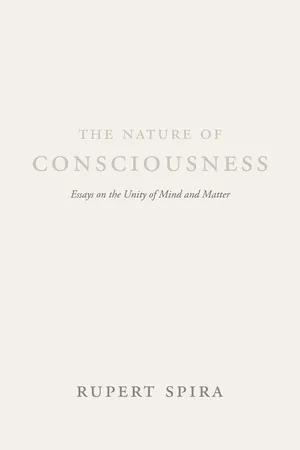
- English
- ePUB (mobile friendly)
- Available on iOS & Android
About this book
"I've gained deeper understanding listening to Rupert Spira than I have from any other exponent of modern spirituality. Reality is sending us a message we desperately need to hear, and at this moment no messenger surpasses Spira and the transformative words in his essays."
—Deepak Chopra, author of You Are the Universe, Spiritual Solutions, and Super Brain Our world culture is founded on the assumption that the Big Bang gave rise to matter, which in time evolved into the world, into which the body was born, inside which a brain appeared, out of which consciousness at some late stage developed. As a result of this "matter model, " most of us believe that consciousness is a property of the body. We feel that it is "I, " this body, that knows or is aware of the world. We believe and feel that the knowing with which we are aware of our experience is located in and shares the limits and destiny of the body. This is the fundamental presumption of mind and matter that underpins almost all our thoughts and feelings and is expressed in our activities and relationships. The Nature of Consciousness suggests that the matter model has outlived its function and is now destroying the very values it once sought to promote.
For many people, the debate as to the ultimate reality of the universe is an academic one, far removed from the concerns and demands of everyday life. After all, life happens independently of our models of it. However, The Nature of Consciousness will clearly show that the materialist paradigm is a philosophy of despair and, as such, the root cause of unhappiness in individuals. It is a philosophy of conflict and, as such, the root cause of hostilities between families, communities, and nations. Far from being abstract and philosophical, its implications touch each one of us directly and intimately.
An exploration of the nature of consciousness has the power to reveal the peace and happiness that truly lie at the heart of experience. Our experience never ceases to change, but the knowing element in all experience—consciousness, or what we call "I"—itself never changes. The knowing with which all experience is known is always the same knowing. Being the common, unchanging element in all experience, consciousness does not share the qualities of any particular experience: it is not qualified, conditioned, or limited by experience. The knowing with which a feeling of loneliness or sorrow is known is the same knowing with which the thought of a friend, the sight of a sunset, or the taste of ice cream is known. Just as a screen is never disturbed by the action in a movie, so consciousness is never disturbed by experience; thus it is inherently peaceful. The peace that is inherent in us—indeed that is us—is not dependent on the situations or conditions we find ourselves in.
In a series of essays that draw you, through your own direct experience, into an exploration of the nature of this knowing element that each of us calls "I, " The Nature of Consciousness posits that consciousness is the fundamental reality of the apparent duality of mind and matter. It shows that the overlooking or ignoring of this reality is the root cause of the existential unhappiness that pervades and motivates most people's lives, as well as the wider conflicts that exist between communities and nations. Conversely, the book suggests that the recognition of the fundamental reality of consciousness is the first step in the quest for lasting happiness and the foundation for world peace.
Frequently asked questions
- Essential is ideal for learners and professionals who enjoy exploring a wide range of subjects. Access the Essential Library with 800,000+ trusted titles and best-sellers across business, personal growth, and the humanities. Includes unlimited reading time and Standard Read Aloud voice.
- Complete: Perfect for advanced learners and researchers needing full, unrestricted access. Unlock 1.4M+ books across hundreds of subjects, including academic and specialized titles. The Complete Plan also includes advanced features like Premium Read Aloud and Research Assistant.
Please note we cannot support devices running on iOS 13 and Android 7 or earlier. Learn more about using the app.
Information
Table of contents
- Cover
- Title
- Copyright
- Contents
- Foreword by Deepak Chopra
- Acknowledgements
- Introduction: The Hard Problem of Consciousness
- Chapter 1: The Nature of Mind
- Chapter 2: Only Awareness Is Aware
- Chapter 3: Panpsychism and the Consciousness-Only Model
- Chapter 4: The Inward-Facing Path: The Distinction between Consciousness and Objects
- Chapter 5: The Direct Path to Enlightenment
- Chapter 6: Self-Enquiry and Self-Remembering
- Chapter 7: The Experience of Being Aware
- Chapter 8: The Essence of Meditation
- Chapter 9: The Outward-Facing Path: Collapsing the Distinction between Consciousness and Objects
- Chapter 10: Existence Is Identical to Awareness
- Chapter 11: The White Radiance of Eternity
- Chapter 12: The Focusing of Consciousness
- Chapter 13: There Are No States of Consciousness
- Chapter 14: Wordsworth and the Longing for God
- Chapter 15: The Shared Medium of Mind
- Chapter 16: The Memory of Our Eternity
- Chapter 17: Consciousness’s Dream
- Chapter 18: The Search for Happiness
- Afterword by Bernardo Kastrup